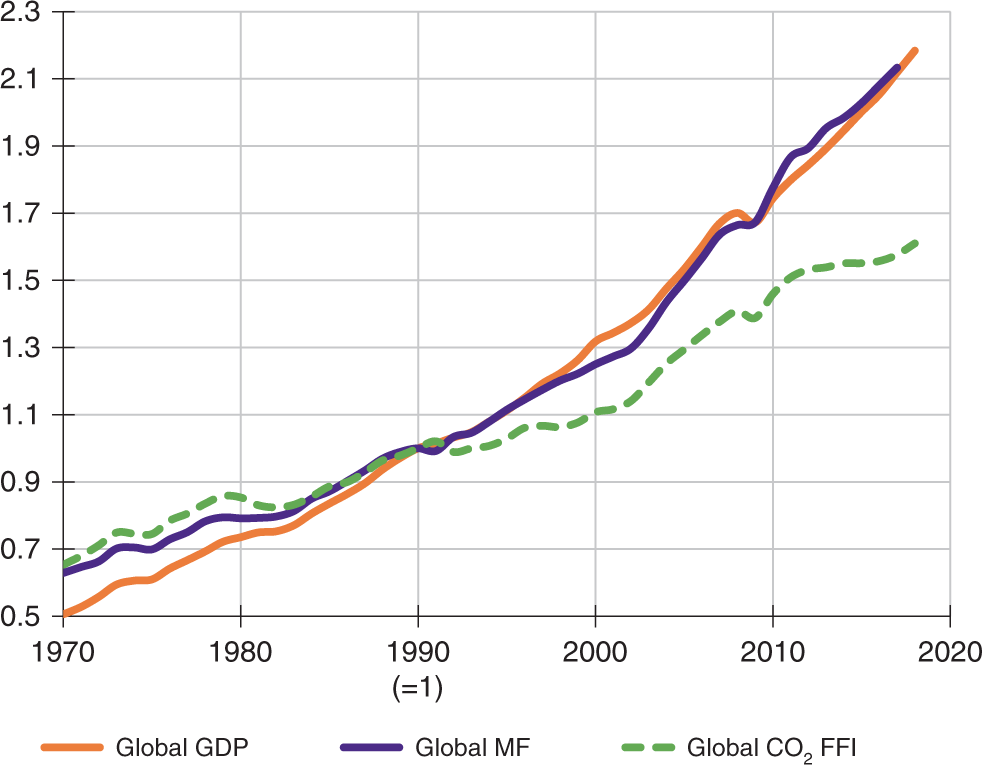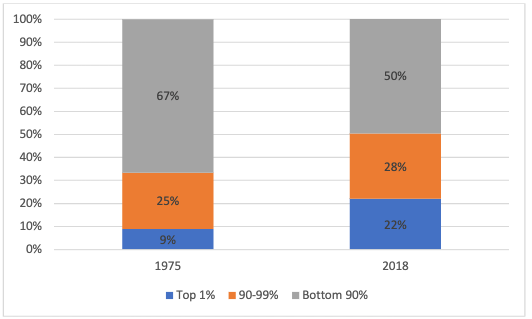Capitalism has developed to engulf the earth, ravaging ecosystems and binding millions in endless toil as nature and labor are exploited for profit. Gross Domestic product, or GDP, is popularly understood as a measurement that represents the economic well being of a population. In reality, it serves to measure capital accumulation in a country, the commodification of all aspects of life into market systems, without consideration of its unequal distribution or the quality of wealth. Economic growth is a material process, dependent on labor and the rate at which a society consumes material resources and energy. To decarbonize swiftly, increase species richness, meet the material needs of all, and use fewer resources, we must confront the economic growth imperative. In the 21st century, an anti-capitalist response to these social and ecological crises must address the limits of our finite planet.
Degrowth serves as an offering and a demand that our social metabolism be turned into a political and democratic project instead of being dictated by the whims of capital. Degrowth is pushing for a thriving and more equal, ecological society within planetary boundaries.
As it stands, no country is providing its population with a strong social foundation within planetary boundaries. Most countries are unable to provide for their populations adequate health, education, and political participation; while other countries provide a certain level of material security at the expense of the natural world. Overcoming this dilemma is the key problem to solve in the 21st century if we want a habitable planet now and for generations to come.

From A Good Life for All Within Planetary Boundaries
One narrative that has emerged to try and ensure both social wellbeing and ecological sustainability is “green growth.” The concept of green growth argues that through technological substitution, efficiency gains, and capitalist innovation, countries of both the Global North and South could continue to grow their economies indefinitely without any limit or consequence to them or the environment. Green growth is the leading political narrative for how we achieve ecological sustainability and improve human wellbeing, having been embraced by leading global institutions such as the World Bank, the IMF, the OECD, and many of capitalism’s most influential billionaires like Bill Gates.
There are several problems with this narrative. The most important is that green growth is not happening and likely won’t. While it is true that very few countries have managed to “decouple” economic growth from C02 emissions, they have done so at very small rates, in insufficient time scales, and have failed to decouple growth from a comprehensive set of environmental indicators. Multiple studies and research reviews have analyzed current and projected decoupling and found that they are inadequate, even under scenarios of high efficiency. Proponents of “green growth” incentivize a ruthless productivism that has contributed to most planetary boundaries being crossed, and thus, put the survivability of humans and millions of species at risk. In the absence of evidence for green growth, degrowth has emerged as an alternative.

From Scientists’ Warning on Affluence
Economic growth is more than just a material process detrimental to the environment. Economic growth is an ideological process as well. For decades, economic growth has served as a tool of the capitalist class to perpetuate itself. It is used to discursively out-maneuver labor demands through promises of shared wealth, and to pressure Global South countries to commit to structural adjustment in exchange for debt relief and loans. It has been a tantalizing ideal, a dangling carrot used to placate class struggle and concentrate wealth among the rich and capitalist class. If economic growth had a slogan, it would be that “growth is the tide that lifts all boats.” Meaning, with increases in economic growth, everyone will ultimately benefit. This message is at the core of neoliberal trickle-down economics that has immiserated the global working class over the last several decades. As Henry Wallich, the former economic advisor to President Dwight D. Eisenhower once said: “Growth is a substitute for equality of income. So long as there is growth there is hope, and that makes large income differentials tolerable.” Rather than seek economic growth in the hopes that it will lift the working class, degrowth seeks redistribution from the wealthy to workers and the poor both within and between countries. This will advance the socialist project of creating an egalitarian society, empower citizens, and reduce environmental pressures without having to rely on whatever gains we are told economic growth will provide us.

From Trends in Income from 1975 to 2018
Economic growth is a 20th century concept that political elites developed during wartime. We are in a new century that imposes its own unique sets of problems. It is quite possible we have seen the end of the high growth era, thereby making the need to move beyond growth an imperative. There are many possible reasons for this. One such reason is that our impending environmental crises are imposing its own limits on growth. According to Swiss RE, 55% of global GDP depends on high-functioning biodiversity. They also found that 10% of global GDP will likely be lost due to the impending climate crisis. If these numbers are even partly true, more frequent economic recession will be inevitable throughout the 21st century due to the ecological problems economic growth itself helped cause. Thus, the imperative for a post-growth future becomes that much more significant. Unlike recessions, which are a necessary component of growth-based economies, degrowth seeks to abolish the growth imperative and become “recession-proof.” Moving beyond growth is not only necessary, but also worthwhile.
The aforementioned represent some of the problems for why we need an alternative to our current ecocidal paradigm. But degrowth is also a desirable, positive, and hopeful vision for the present and future.
For one, many of the policies within the degrowth framework are beneficial and popular. These include measures such as a green job guarantee paired with a shorter working week; a minimum and maximum income; universal public services; share and repair mandates on consumer goods; a shift to plant-based diets, active modes of transport, efficiency and sufficiency measures, and much more. This suite of policy solutions is one of degrowth’s strongest selling points.
Given the recognition of the uneven ecological exchange between the Global North and South in its analysis, degrowth is the most robust form of global environmental justice currently on offer. Pursuing degrowth in the Global North would allow Southern nations room to chart their own economic course while limiting environmental damage, thus converging the two poles in terms of energy and material use, and importantly, political power on the global stage. Through internationalist policies like a debt jubilee, democratization of global finance, and degrowing the US military, we believe such measures among others would greatly reduce the effects of the colonial boot the US has had on Southern nations for centuries, thus furthering global equality and freedom.
Our society suffers from both an impending ecological crisis and also a crisis of democracy. Degrowth not only stands for a green transition anchored in democracy, but also to enhance the current (un)representative forms of democracy found all over the world into more direct and participatory forms. There is reason to believe that degrowth and stronger democracy are self-reinforcing. As Giorgos Kallis has argued, ‘Genuine democratic socialism cannot grow at the pace of capitalism, which sidelines and destroys what slows it down.” Degrowth is fundamentally about democratizing production, where what is deemed essential, what is not, and the subsequent ecological and social costs associated are decided in much stronger democratic formations. This will likely slow down production in order to enhance participation.
These are just some of the reasons we believe degrowth is a desirable path forward. However, we are not naive to the difficulty of achieving ecosocialist degrowth. It depends on an unprecedented amount of change, all happening in the same direction, within this century. But, we already know dramatic change is going to happen with or without degrowth. In the words of the 2018 IPCC report, our civilization requires “rapid, far-reaching and unprecedented changes in all aspects of society.” Unlike other green transition narratives, degrowth meets the moment with its grounding in global social justice, strong ecological sustainability and wellbeing for all on a finite planet. It is vital that we transition these scientific findings and activist discussions into the wider public debate, build the necessary power to make degrowth happen, and ensure that all are taken care of as we build a new ecological society. Time is short. Let’s get to work!
Please visit Caracol DSA’s Points of Unity for more information.
